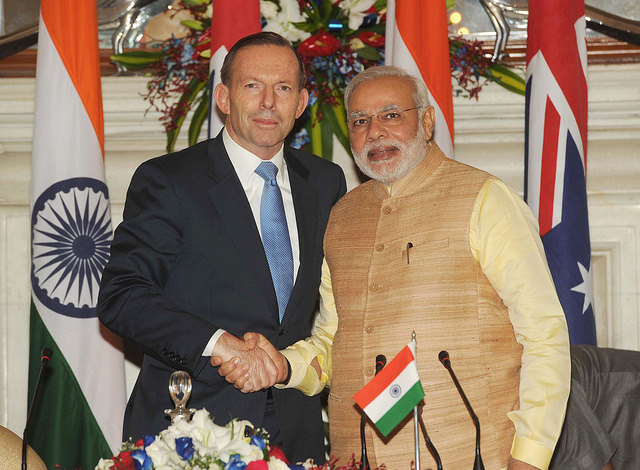
The slow and stuttering course of the Australia–India relationship over the last 70 years has been troubled by the Curse of the Cs.
The Cs are about what the two Indian Ocean states seem to have in common: cricket and Commonwealth, and a common elite language from a colonial past.
The Cs suggest nearness and understanding where little exists. The Curse of the Cs is to conceal what India and Australia actually know of each other. Even the greatest shared value—democracy—misleads about the meeting of minds, because the two democracies are so extraordinarily different in every dimension.
One other of the Cs doesn’t get as many mentions as the Commonwealth or cricket, but it has been part of the promise and part of the curse—leadership chemistry.
The shared will of leaders has never been enough to get India and Australia together. The differences of history and beliefs and systems have easily defeated determined leaders pushing in sync in New Delhi and Canberra.
The latest chemistry experiment is Tony Abbott's
embrace of Narendra Modi ‘as more than a kindred spirit, as almost a brother.'
Leaders dabbling with their charismatic chemistry can produce strange experiments, even explosions. Kissinger’s barb is that nothing is more dangerous in diplomacy than two leaders getting together and thinking they can solve stuff with personal chemistry and a chat—the stuff they think they’re solving turns into a higher-order stuff-up delivered from the summit.
As a journalist, I’ve written a couple of times about the aspirations sparked by surprising personal chemistry between Indian and Australian prime ministers. The oddest odd-couple: Moraji Desai and Malcolm Fraser in the late 1970s—a meeting of minds between an octagenerian leftist and a conservative patrician grazier. Desai and Fraser joined in an attempt to deepen the bilateral relationship and to broaden the remit of the Commonwealth to give it a stronger Asian focus. Both efforts faded fast as they left the scene.
In the 1980s, the chemistry between Rajiv Ghandi and Bob Hawke was even stronger. Hawke radiated exuberance and warmth in talking about Rajiv.
They bonded during battles inside the Commonwealth over sanction against South Africa’s apartheid regime. Fighting Margaret Thatcher stirred Hawke’s battle lust and sparked an unusual fire in Rajiv.
In one of the last great formal dinners in Canberra's Old Parliament, Rajiv Ghandi and Bob Hawke stood together and bathed in mutual affection. The personal warmth given off by the two Prime Ministers one night in October, 1986, proclaimed that anything was possible in reaching across the Indian Ocean. After the avocado, roast lamb and fruit salad, the two leaders devoured a feast of shared admiration.
Rajiv Gandhi toasted Hawke: 'I am repeatedly asked, by the Australian media, what there is to the special relationship between you and me, Bob. Of course, you're a delightful person, but there is much more to it than just that.'
Gandhi said Australia and India had confined their relationship to cricket and the Commonwealth, and his trip marked a turning point:
'In earlier years, it was not entirely clear whether Australia was an antipodal outpost or belonged to our part of the world. Australia's policies and influence are now centre-stage in international affairs. We see that the destinies of our countries are tied-in with the Indian Ocean which laps both our shores. Arising out of our shared democratic values, we have a common interest in justice, fair-play and human rights.'
Nearly two decades earlier, Rajiv's mother, Indira Gandhi, as the first Indian prime minister to come to Canberra, stood in the same building and spoke of Australia as a bridge:
'Australia looks out on the world in two directions. On the one side lies the Indian Ocean and the developing monsoon lands of Asia. On the other lies the Pacific and the affluent “new world”. Australia does not have to choose between these two worlds. It can act as a bridge between them. We are glad that it is doing so.'
Indira Gandhi seldom walked over that Australian bridge ever again. And for all his enthusiasm, her son couldn’t build much beyond that 'antipodal outpost' line.
Indira and Rajiv, at least, didn't maintain a family grudge against the land of Oz because of the diabolically bad chemistry between Jawaharlal Nehru and Robert Menzies.
When the pair clashed at the United Nations in 1960, arguing over the Cold War, Nehru took the rostrum to savage Menzies, denying that the Australian's views could be taken seriously.
Menzies’ version was that Nehru was poisonous, sneering and grossly offensive: 'All the primitive came out in him.' This was personal chemistry as explosive device.
John Howard was extremely positive about India's growing importance. In the last stanzas of his memoirs, Howard predicts that India will prevail over China in the great contest of the 21st century. Howard's attempts at chemistry got little response, with New Delhi taking the view that such efforts were merely Australia paying proper tribute.
When, in retirement, Howard reached for the top administrative job in international cricket, he was vetoed by India; even cricket can be a metaphor for conflicting institutional ambitions.
The next column will look at the opportunity for Tony Abbott to reach beyond personal chemistry with his 'brother' in New Delhi.
 Print This Post
Print This Post The slow and stuttering course of the Australia–India relationship over the last 70 years has been troubled by the Curse of the Cs.
The slow and stuttering course of the Australia–India relationship over the last 70 years has been troubled by the Curse of the Cs.